REAPING THE FRUITS OF LABOR
A winemaker in Tabuk City, Kalinga is now enjoying the fruits of their labor—quite literally.
Brienda Gup-ad had always wanted to establish her own fruit wine business. She used to spend time observing how her mother would make bugnay wine at home. Eventually, she tried making her own, but an improved version.
Brienda noticed that her mother would only estimate the quantity of ingredients used, she knew this needs improvement. Brienda made sure to have exact measurements of the ingredients so the wine would not turn into vinegar.
Her initial plan was to produce fruit wines for special occasions like Christmas, New Year, and fiestas. This meant, however, that there will be period of lean months and the possibility of no income. Knowing that setting up this kind of business would require money, time, and effort, she decided to work in Saudi Arabia in the 1990s to save enough capital.
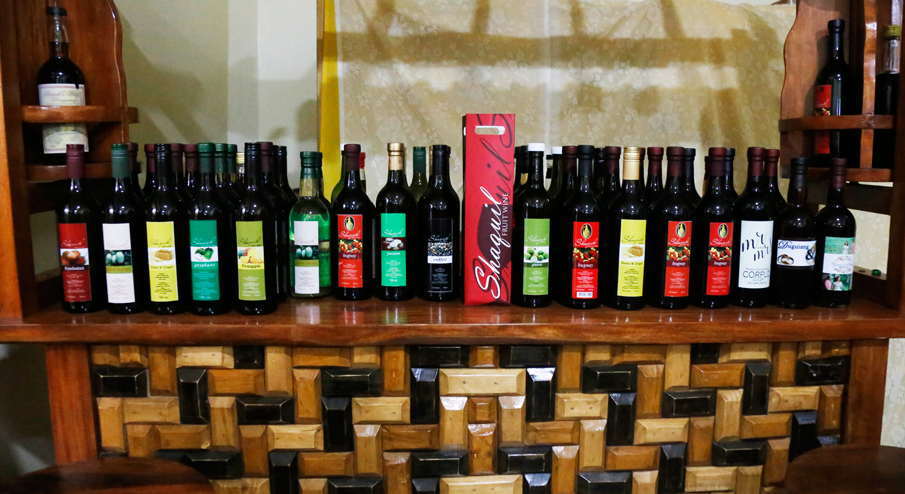
In 2012, she went back to the Philippines to make her dream a reality. She put up her fruit wine business under the label Shaquil Food Products.
Brienda’s home had bugnay at the backyard, so she used this as the main ingredient for the fruit wine business. “I spent time trying to come up with the best recipe, which could pass as a commercially viable fruit wine,” she said.
Brienda conducted several tests to get the quality of wine that she would be confident to sell in the market.
“I started small since I knew I still had a lot of things to learn before I could introduce my product to big groceries and to other areas,” she said, adding that she needed to establish the brand first in her hometown before penetrating the market of nearby areas.
She managed to raise Php 45,000 as capital, which allowed her to produce hundreds of bottles of bugnay and guyabano wines per month. She sold the fruit wines at Php 120 per bottle to individuals and some sari-sari stores in Tabuk City. She did not have her own client base back then yet.
Knowledge as capital
More than the monetary capital, she knew that the greatest capital needed was her knowledge of the business. She invested time, effort, and money in improving her skills and knowledge in running a fruit wine business. She signed up for various trainings and seminars, especially those provided by the Department of Trade and Industry (DTI).
In between these trainings and seminars, she would attend food bazaars and trade fairs.
After a few years in the business, she was able to apply the theoretical learnings into her enterprise. Among the important lessons she learned was the process of handling the fruits, which was crucial in producing high-quality fruit wines. During the phase of attending seminars and trainings, she realized that the production process is done improperly.
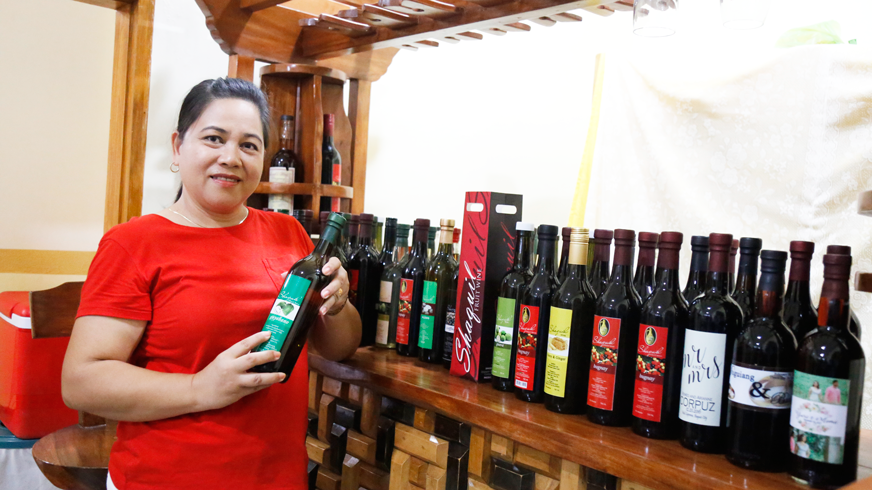
“I really am glad that I invested my time and effort in attending such seminars. It turned out that we’ve been doing things the wrong way, which could affect the quality of products we sell in the market,” said Brienda who claimed that they introduced significant changes that helped boost the production and sales.
These years of failing, trying, and learning all paid off when Shaquil Food Products started getting a seemingly never-ending orders of fruit wines. Today, Shaquil Food Products is a household name not just in Kalinga, but in nearby areas as well.
Doing this kind of business is quite a challenge since guyabano and bugnay are seasonal. To respond to this challenge and to expand its market further, the management decided to introduce additional fruit wine variants including pineapple, rambutan, passion fuit, guava, mango, pineapple, and guava. This has helped them ensure a year-round production, benefitting not just the business but its workers as well.
Challenges
When Shaquil Food Products was just starting, Brienda admitted that she faced a lot of challenges. “I was all alone at the start. I had to pick the fruits myself and process them to produce wine,” she shared. She added that her husband did not support her idea at the start.
Brienda would go to her mother’s house to process the fruits she has picked. Her mother allowed her to use one of the rooms in their house to serve as her production area. But since Brienda is determined to succeed and was aware that reaping the rewards would take time, she faced this phase of starting her venture wholeheartedly.
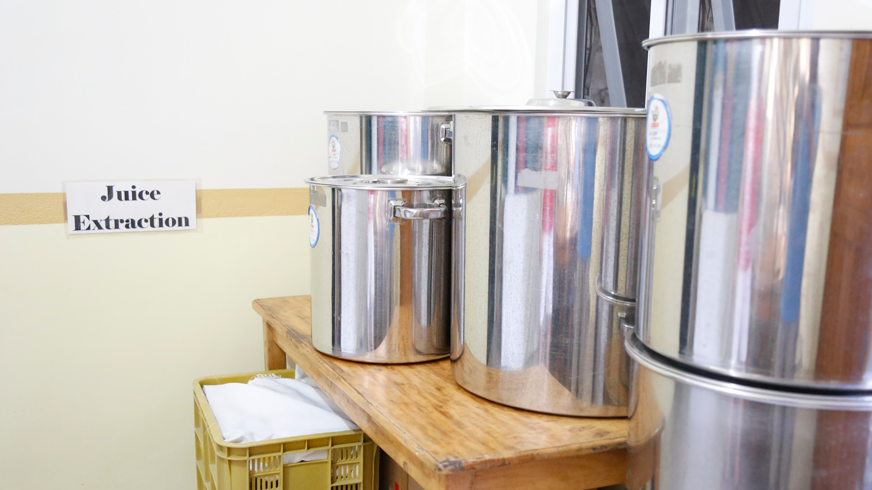
Another challenge which she turned into a lesson is the actual process of making wine. Brienda was doing it wrong at the start when she mixed the fruits that came from different trees all together. “The quality suffered, so I decided to redo it over and over again,” she said.
Brienda studied the process very well, and prepared for any possible sales pitch. To build her brand in the industry, she would spend time approaching individual buyers.
At that time, Brienda did not know that there were several types of programs offered by government offices such as the DTI. She felt intimidated at the start, and was so shy to approach DTI for assistance.
Determined to succeed, she visited a DTI office to register her business and inquire about assistance it offers.
Brienda enrolled in Kapatid Mentor ME program Kapatid Mentor ME program, where as a mentee, she learned best practices from established entrepreneurs. Brienda recalled that she would periodically travel to Baguio City to attend the sessions.
At the start, Brienda was clueless on how to market new products but DTI helped by equipping her with the necessary skills and knowledge through some trainings and seminars.
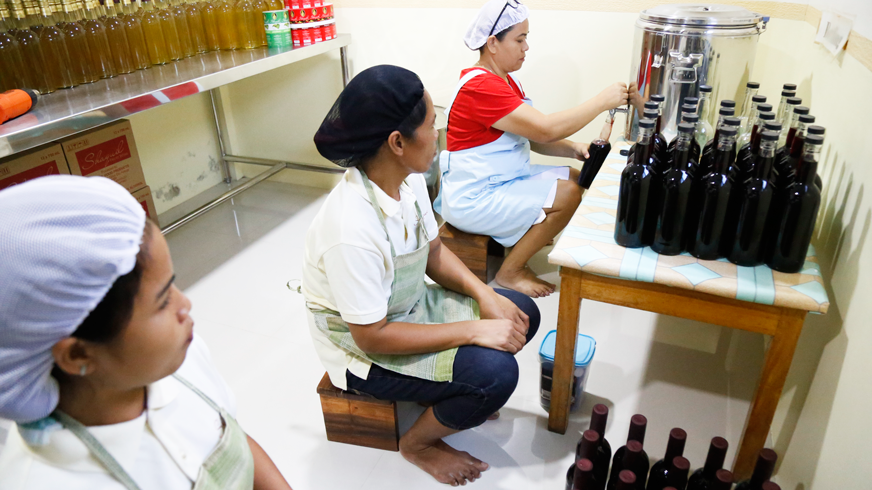
Aside from DTI, Brienda also received assistance from different government agencies such as the Department of Science of Technology (DOST). Both DTI and DOST significantly helped Brienda process her certification from the Food and Drug Administration (FDA).
Reaping the rewards
Today, Brienda has been reaping the rewards of her hard work and dedication. From a small room in her mother’s house, she now has a warehouse and processing area.
“There has been great improvement in my business. Now, I am no longer worried that we would run out of stocks,” she said.
Brienda was able to widen her network and set up a client base not just in Kalinga but in different areas in the Cordillera region and Metro Manila as well. From sari-sari stores and individual buyers, her clients now include groceries, restaurants, and hotels.
She would always be grateful. Looking back, she recalled that there were times when they did not have enough money for family emergencies or even for eat outs during holidays.
Brienda is grateful for all the grace that she and her family have been receiving by taking care of clients and workers.
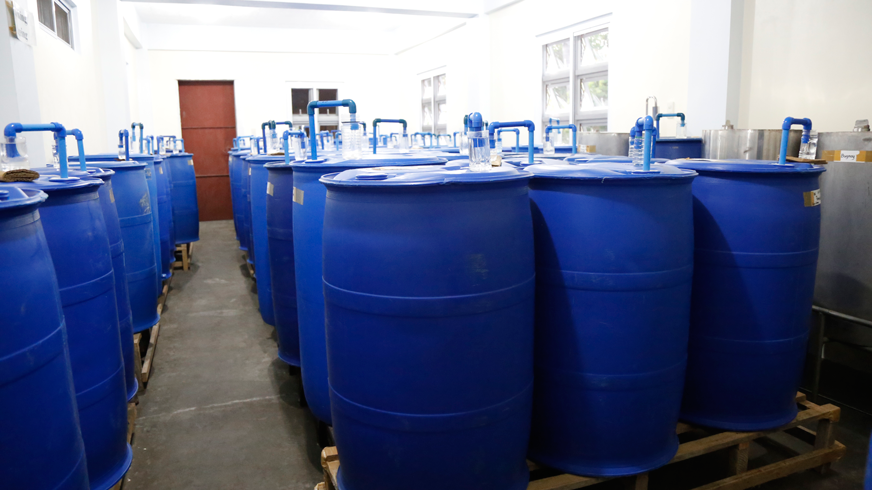
Success has enabled Brienda to be a mentor, sharing her learnings to budding entrepreneurs at seminars and trainings organized by DTI.
Brienda was able to acquire a farm lot for fruit production. This is also important to ensure that they would have enough supply for the production of their fruit wine.
Other aspiring entrepreneurs can learn a thing or two from Brienda. “If you want to start a business, it should be on something that you love. Otherwise, you would easily give up whenever there are challenges,” she said. Instead of focusing on problems, Brienda said entrepreneurs should focus on finding solutions.
She also stressed the importance of skills improvement in any kind of business. “You should always be open to learning. Even if you have the capital to put up your own business, if you do not have the knowledge and willingness to learn, everything will be useless,” according to Brienda.
To give back, Brienda makes sure to take care of workers who have been instrumental in the success of her venture. “They would appreciate even the smallest rewards we would give to them—even as simple as treating them dinner,” she said. She added that it is also important to pay them fairly.
Brienda has a lot of plans for her business, to provide better products to clients and care for workers.



